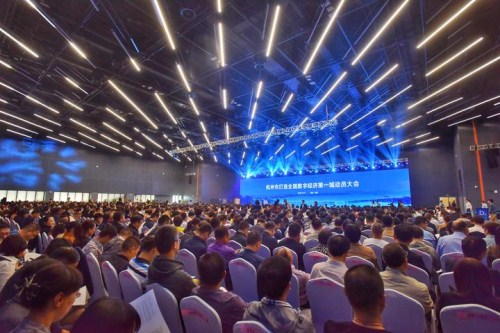Hangzhou seeks to take the lead in national digital economy

A forum discussing how Hangzhou can take the lead in the country's digital economy is held in Hangzhou, Zhejiang province, on Oct 11. [Photo/zjol.com.cn]
Hangzhou, home of China's e-commerce giant Alibaba Group in Zhejiang province, is seeking to take the lead in the country's digital economy by boosting technological innovation and industrial transformation, according to a forum held on Oct 11.
The initiative, rolled out by the city's government, outlines that the total output of the city's digital economy is expected to reach 1.2 trillion yuan ($173.3 billion) by 2022.
To reach the goal, Hangzhou will make full use of its advanced digital resources and promote the development of competitive industries, including big data, cloud computing, e-commerce, internet of things and artificial intelligence (AI).
Innovation driven by data-driven technology will also increasingly be applied in traditional industries. With the help of Alibaba's ET Industrial Brain, an AI system based on production data to control manufacturing processes, the product qualification rate of tyres in traditional tyre-making company Hangzhou Zhongce Rubber Co increased by 6 percent in 2017, leading to a total revenue of 150 million yuan.
In terms of urban management, Alibaba Cloud's City Brain solution, which deploys AI technology in transport management, will continue to play a role in Hangzhou's ambition to stay at the forefront in building a digital city.
"Hangzhou boasts a solid foundation in digital economy with a large number of innovative hi-tech and internet companies, including Hikvision, Alibaba Group and New H3C Group", said Ma, founder and chairman of the Alibaba, adding that the company is willing to contribute its own knowledge and technological experience in offering digital solutions.
According to official statistics, the digital economy was one of the major drivers for the city's economic performance in the first half of 2018, whose revenue hit 445.6 billion yuan, a surge of 22.8 percent over the same six months last year. The added value accounted for more than 25 percent of the city's GDP.
-
Why Hangzhou is on Nature's cover for the second time in three months
December 16, 2025
-
Hangzhou to build rocket manufacturing base
December 12, 2025
-
Hangzhou reports steady Jan-Oct economic performance
November 26, 2025
-
Global content creators discover Hangzhou's tech magic
December 2, 2025



